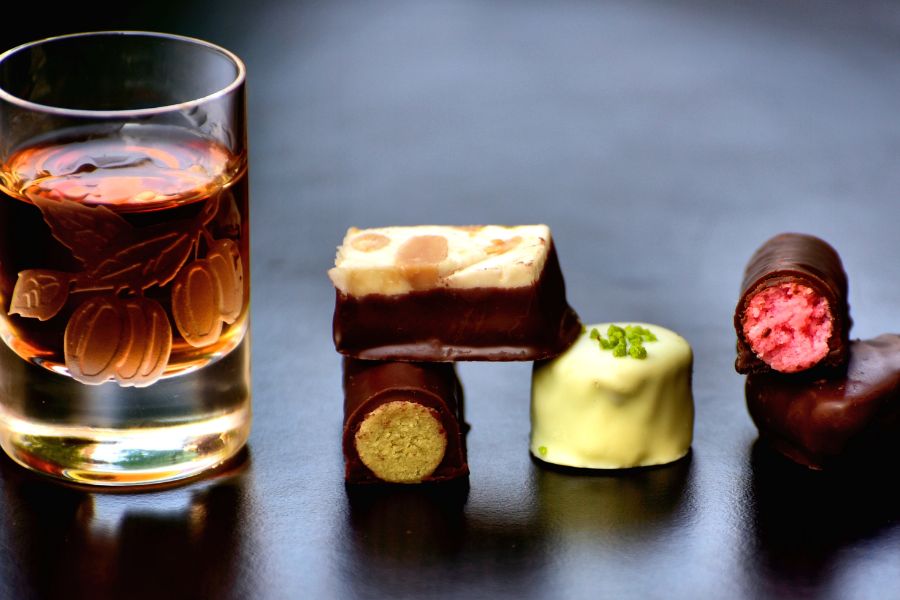German liquor encompasses a wide variety of alcoholic beverages originating from Germany, including beer, wine, and spirits such as Schnapps and Obstler. These drinks often reflect the country’s rich brewing and distilling traditions, with many regional specialties and unique flavors.
German liquor is renowned for its high quality and adherence to strict production standards, and it is a significant part of the country’s cultural and culinary heritage. From the world-famous Oktoberfest to the intricate art of Schnapps distillation, German liquor offers a diverse and vibrant drinking experience for both locals and visitors alike.
Whether you’re savoring a traditional beer in a Bavarian beer garden or enjoying a glass of Riesling in the vineyards along the Rhine, German liquor provides a delightful journey into the flavors of this fascinating nation.

The Rich History Of German Liquor
German liquor has a rich history that reflects both tradition and innovation. From the production methods to the unique flavors, the evolution of German liquor tells a compelling story of craftsmanship and cultural influence.
Traditional German Liquor Production
The production of German liquor is deeply rooted in tradition, with many artisanal distilleries following age-old methods that have been passed down through generations. Distillers pay meticulous attention to detail, using high-quality ingredients to create distinct flavors that capture the essence of German craftsmanship.
Evolution And Influence Of German Liquor
German liquor has evolved over time, blending traditional techniques with modern innovation. The influence of German liquor extends beyond its borders, shaping the global spirits industry and captivating enthusiasts with its unique profile and cultural significance.
Exploring Popular German Liquors
When it comes to German liquors, the country has a rich and diverse tradition of producing high-quality spirits. Let’s take a closer look at some of the most popular ones, each offering a unique taste and history.
Schnapps: A Versatile Fruit-based Liqueur
Schnapps is a beloved German liquor known for its diverse range of flavors, typically derived from various fruits such as apples, pears, and cherries. Often enjoyed as a digestif, this fruity liqueur is also a key ingredient in many cocktails, making it a versatile choice for any occasion.
Jägermeister: A World-renowned Herbal Digestif
Jägermeister is a famous German herbal liqueur with a complex blend of 56 botanicals, including herbs, fruits, and spices. Known for its distinct taste and deep amber color, it has gained global recognition as a staple in the world of digestifs, often savored as a shot or in cocktails.

Kirschwasser: The Unique Cherry Brandy
Kirschwasser, also known as kirsch, is a unique German cherry brandy with a pronounced cherry flavor and a smooth, slightly sweet profile. This clear spirit is popular in both culinary and cocktail applications, adding a delightful fruitiness to a wide range of classic drinks and dishes.
Genever: The Dutch-german Ancestor Of Gin
Genever holds a significant place in the history of spirits, serving as the ancestor of modern gin and sharing close ties with both Dutch and German traditions. Distinct for its malted grain base and botanical infusion, genever offers a distinctive herbal and juniper flavor profile, making it a fascinating choice for those who appreciate the origins of gin.
German Liquor And Cultural Traditions
Germany is famous for its rich cultural heritage, and one aspect that contributes to its vibrant traditions is German liquor. The country’s liquor plays a significant role in celebrations, festivals, and daily life, often accompanied by unique rituals and toasting etiquette. In this article, we will explore the relationship between German liquor and cultural traditions, delving into the fascinating world of German festivities and the customs associated with their beloved spirits.
German Liquor In Celebrations And Festivals
When it comes to celebrating special occasions and regional festivals, German liquor takes center stage. It becomes an indispensable part of the festivities, adding an extra touch of merriment to the event. Whether it’s Oktoberfest, Karneval, or Christmas markets, German liquor is always in the spotlight.
In particular, Oktoberfest, the world’s largest beer festival held annually in Munich, showcases the deep-rooted connection between German culture and its beloved beverage. In addition to beer, other traditional German liquors like schnapps, jägermeister, and kirschwasser also find their place in festivals, giving attendees a taste of the country’s authentic flavors.
Liquor Rituals And Toasting Etiquette In Germany
In Germany, toasting is not taken lightly, as it embodies social etiquette and respect for one another. Before taking that first sip, it is customary to look each person in the eye and clink glasses together. This gesture is seen as a sign of trust, goodwill, and friendship.
Moreover, there are specific toasting expressions that are commonly used, such as “Prost!” meaning “Cheers!” and “Zum Wohl!” meaning “To your health!” These phrases are spoken with enthusiasm and often accompanied by a firm clinking of glasses, adding an air of excitement to the festivities.
To further emphasize the importance of toasting, Germans have a tradition known as “trinkfestigkeit,” or drinking endurance. This practice involves toasting continuously throughout the gathering as a way to demonstrate camaraderie and goodwill.
In conclusion, German liquor is not only a beverage but a symbol of cultural traditions and social cohesion. It has deep roots in celebrations and festivals, where toasting rituals and etiquettes are cherished and followed. So, the next time you have a sip of German liquor, remember the customs that make it more than just a drink, but a cultural experience.

Key Ingredients And Production Techniques
German Liquor is crafted with key ingredients and production techniques that result in a unique and flavorful experience. Expertly curated ingredients are combined using traditional methods, creating a rich and distinctive German liquor unlike any other.
The Importance Of Local Ingredients
German liquor is renowned for its bold flavors and high-quality ingredients. The use of local ingredients is not just a matter of tradition, but it also plays a crucial role in defining the distinct character of German spirits. By sourcing ingredients locally, German distillers ensure the freshness and authenticity of their products.
Local ingredients are carefully selected to create the perfect balance of flavors. Take, for example, the famous Jägermeister, a herbal liqueur that includes 56 different herbs, fruits, roots, and spices. The ingredients are sourced from the forests and fields of the Lower Saxony region, where they grow in abundance and thrive in the unique climate.
Not only do German distilleries prioritize local ingredients for their exquisite taste, but they also place great emphasis on supporting sustainable farming practices. By partnering with local farmers, distillers can maintain a close relationship with their suppliers, ensuring the highest quality ingredients while also supporting the local economy.
Distinctive Distillation Methods In German Liquor
German liquor stands out not only for its ingredient selection but also for its distinctive distillation methods. Each type of spirit has its own unique production techniques that have been perfected over centuries of German distilling tradition.
One such technique is the use of pot stills, which are widely employed in the production of German schnapps. These traditional copper pot stills allow for a slower and more controlled distillation process, resulting in a smoother and more complex flavor profile. The pot stills also retain the character of the base ingredients, ensuring that the essence of the local fruits and herbs shines through in the final product.
In addition to pot stills, German distillers also utilize column stills for certain spirits, such as vodka. The continuous distillation method employed by column stills allows for a higher degree of purity and refinement, perfect for producing a clean and neutral base spirit. The use of both pot stills and column stills in German liquor production showcases the versatility and adaptability of German distillers.
German Liquor: From Cocktails To Culinary Delights
When it comes to beverages, German liquor is renowned for its rich history and diverse flavors. From classic cocktails to incorporating German liquor in gastronomy, there are countless ways to enjoy the unique taste of this spirit. In this article, we will explore two exciting aspects of German liquor: classic cocktails and its usage in culinary delights.
Classic German Liquor Cocktails
German liquor offers a delightful basis for classic cocktails that have captivated taste buds for generations. These cocktails are perfect for gatherings, celebrations, or simply unwinding after a long day. Let’s take a look at some popular concoctions:
- Berlin Mule: A refreshing twist on the classic Moscow Mule, this cocktail combines German liquor with ginger beer and fresh lime juice. It’s a zesty and tangy choice that will surely impress your guests.
- Black Forest Martini: Inspired by the famous Black Forest cake, this martini blends German liquor with dark chocolate liqueur and a hint of cherry brandy. Indulge in the rich and decadent flavors of this sophisticated cocktail.
- Gin Fizz Bavarian Style: Shake things up with this invigorating cocktail that combines German liquor with gin, lemon juice, and soda water. This effervescent drink is perfect for a sunny day or a casual get-together.
These classic German liquor cocktails showcase the versatility and impeccable taste this spirit brings to the mixology world. Whether you prefer a tangy kick or a velvety finish, there is something for every palate.
Incorporating German Liquor In Gastronomy
German liquor isn’t just limited to cocktails; it can also add depth and complexity to culinary creations. Its unique flavor profile and distinctive aromas make it a valuable ingredient in various dishes. Here are some innovative ways to incorporate German liquor into gastronomy:
- Flambéed Sausages: Impress your guests with a sizzling showstopper by flambéing your sausages with German liquor. This cooking technique not only adds a delightful caramelized flavor but also adds a touch of theatricality to your culinary presentation.
- German Liquor-infused Sauces: Elevate your sauces by incorporating German liquor. Whether it’s a creamy mushroom sauce with a hint of German liquor or a tangy barbecue sauce with a boozy twist, these flavors will take your culinary creations to new heights.
- German Liquor-infused Desserts: From creamy liqueur-infused custards to boozy cakes, German liquor can transform ordinary desserts into extraordinary culinary delights. The rich and aromatic notes of the spirit elevate the sweetness and create a harmonious symphony on your taste buds.
By incorporating German liquor into your gastronomic adventures, you can unlock new dimensions of flavor and create memorable dining experiences. The possibilities are endless, limited only by your imagination.

Frequently Asked Questions On German Liquor
What Are Some Popular German Liquors?
Some popular German liquors include Jägermeister, Schnapps, and an herbal liqueur called Underberg. Each of these liquors offers a unique taste and is enjoyed by both locals and tourists alike.
How Is German Liquor Made?
German liquor is often made through a process called distillation. This involves heating a fermented mixture and collecting the condensed vapor to create a more concentrated and flavorful drink. Different ingredients and methods are used to create various types of German liquors.
What Is The Alcohol Content Of German Liquor?
The alcohol content of German liquor can vary depending on the type. However, most German liquors typically have an alcohol content ranging from 20% to 40%. It’s important to drink responsibly and be aware of the alcohol percentage when enjoying these beverages.
Conclusion
German liquor offers a delightful and unique experience for liquor enthusiasts around the world. Its rich history, high-quality ingredients, and skilled craftsmanship all contribute to its exceptional taste. Whether you prefer a smooth schnapps, a flavorful herbal liqueur, or a refreshing beer, German liquor has something to satisfy every palate.
Explore the diverse range of flavors and traditions that make German liquor so special, and cheers to the wonders of this cultural libation.
